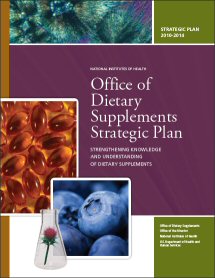The National Office of Dietary Supplements - Free Information

Government Support
Dietary supplements are an interesting group of nutritional products that can be confusing in nature and sometimes the foundation of business scams. The National Institutes of Health provide an Office of Dietary Supplements for regulating their use in America and suggesting best practices associated with them. the office provides an online group of related search-able databases and information about current and past research, funding, and even training programs.
The Office of Dietary Supplements (ODS) at the NIH was founded in 1995 under the Dietary Supplement Health and Education Act of 1994 (see Public Law 103-417, DSHEA). Thus in 2010, the Office is less than 20 years old and points to an increasing trend in America towards embracing alternative and adjunct methods of enhancing health and wellness in the country. Nutrition, and with it, dietary supplements, are part of this trend that is growing in acceptance and scientific validity,
The ODS Strategic Plan for 2010-2014 is available at their website, just as employment outlook forecasts are available a decade at a time form the Department of Labor. The ODS plan is for increasing and strengthening the body of knowledge about dietary supplements as whole.

National Nutrition Summit
Healthy People 2000 was the first national health initiative plan of the US Surgeon General's Office, with research beginning in the 1990s. Since updated to Healthy People 2020, the plan includes dietary and nutritional goals for all of America. related to that, Michelle Obama's Let's Move program, reflected in the Health Schools Act of Pennsylvania, adds additional momemtum and adjunct material to the health portion of the plan.
Long term nutritional studies were begun by NIH in 1969 with the 1969 White House Conference on Food, Nutrition, and Health. The first related national surveys were conducted in 1971, which led to the Women's, Infant and Children (WIC) Program forming in 1974. The first set of US national dietary guidelines appeared in 1980. A decade later, the Nutrition Labeling, and Education Act passed in 1990, followed by the first Food Pyramid guide in 1992.
In May 2000, the National Nutrition Summit occurred. The second item on the agenda was Nutrition and Lifestyle Approaches to Solving the Nation's Epidemic of Overweight.Some findings are:
"Nearly 55%t of the US adult population was overweight or obese (Body Mass Index: BMI >25) in 1988–1994, compared with 46 percent in 1976–1980. Overweight is observed in children over 6 years of age, in both males and females, and in all subpopulations...Research aimed at understanding basic mechanisms in the development of obesity, developing the most effective interventions, and translating this knowledge into action (including schools, worksites, and communities) will be a necessary component."
Effective use of dietary supplements may help to control body weight overall and aide when food intake in reduced during weight-loss programs. The ODH provides some healpfull pages on its website for using supplements:
- Dietary Supplement Ingredient Database - Data gathering begun n 2004
- Adult Multivitamin/Mineral (MVM) Calculator
- Additional priorities - Antacids, calcium supplements, other single and multi-mineral supplements, vitamin E, vitamin C, B vitamins, and caffeine products.
- Dietary Supplement Label Database- Work began in 2001, including records of US dietary supplement usage science 1988. The final database will provide the exact composition of dietary supplements derived from analytical chemical data.
- CARDS (Computer Access to Research on Dietary Supplements) - Database on the ODS site that may be searched online.
- Other

ODS Dietary Supplement Fact Sheets
Dietary supplement fact sheets are available at the related National Center for Complimentary and Alternative Medicine on a wide range of dietary supplements. This information ranges from data gathered about such diverse supplements as calcium, bitter orange, bovine cartilage, lavender, soy, valerian, zinc, collodal silver, and aloe vera. Several dozen fact sheets are provided, free to download and share. In addition, the NCCAM provides a free document entitled How to Using Supplements Wisely.
As defined unter the 1994 legislation mentioned above, a dietary supplement is product ent other than tobacco that
- Is to supplement the diet;
- Contains at least 1 dietary ingredient, i.e., vitamins, minerals, herbs, other botanicals, amino acids, and others; or their constituent parts;
- Is to be taken by mouth as a pill, capsule, tablet, or liquid;
- Is labeled on the front panel as "dietary supplement."
In the addition to the above requirements, dietary supplements are not permitted to include advertising or claims that they can diagnose, treat, help, or cure any medical condition or diease.

Information From the Federal Drug Administration
- Using Dietary Supplements
Dietary Supplements: Consumer Education and General Information

ODS Education and Training Programs
Top school around the country are offering programs to study the usefulness and effects of dietary supplements and other nutritional elements. Some of these schools are:
- Harvard University-- Omega-3 fatty acids, nucleotides, and glutamine
- ODS Botanical Research Centers- Iowa State University, University of Illinois at Chicago, Purdue University, University of California at Los Angeles, University of Arizona, Pennington Biomedical Research Center at LSU, Wake Forest and Brigham and Women's Center for Botanical Lipids, Memorial Sloan-Kettering Cancer Center Research Center for Botanical Immunomodulators.
- University of Missouri- Phytochemicals relative to prostate cancer.
- Collaboration of NIH centers- dietary supplements in the metabolic regulation of body weight; dietary supplements in proliferative retinopathy and ocular inflammation; flavonoids, glucose tolerance and vitamin C, supplemental vitamin C in cancer treatment; dietary supplements and diabetes, pregnancy, and sickle cell anemia, and other conditions and processes.
Other training programs, grant funding, practica, seminars, and other learning opportunities are available through the ODS.
Manuals and Guides











